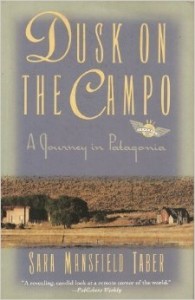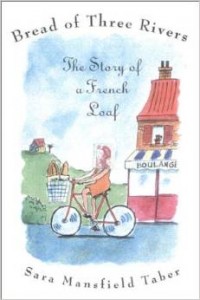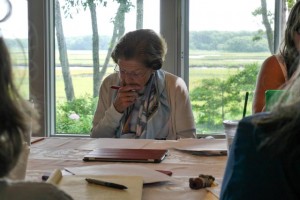The Summer 2014 New Directions writing retreat included features that are familiar and much loved — six days of writing workshops held in Deirdre and Jack’s beautiful home in West Harwich on Cape Cod, shared meals, and a day off for fun – as well as something new and exciting – the addition of Sara Taber as a writing instructor. Many New Directions participants know Sara from her eight years (so far) running a Sunday group and a Saturday workshop during the weekend retreats. Because in the past I’ve described what happens at the summer retreat (Summer 2012 and Summer 2013), for this entry, I decided to focus on our two writing instructors, Sara and Deirdre. As will be obvious in these portraits of Sara (here) and Deirdre (in an entry to follow), the heart of the New Directions program is the incredible quality of the writers with whom we have the privilege to work.
Sara brings unique qualifications to her work with us at New Directions. As a former practicing therapist, she has insight into the kinds of concerns many participants bring to their writing. As a cultural anthropologist and an accomplished writer, Sara has a keen ability to observe and describe the details of a given setting and the nuances of what is taking place and of the motivation of the characters.
As detailed in her latest book, Born Under an Assumed Name: The Memoir of a Cold War Spy’s Daughter , Sara grew up in Asia, Europe and the U.S. She earned an M.S.W. from The University of Washington and worked at the Stanford Child Psychology Clinic as well as spending six years in private practice. Sara then did her Ph.D. at Harvard, where she studied cross-cultural human development and psychological anthropology. In a thrilling moment of recognition for me, I learned that Sara’s Ph.D. advisor was Bob LeVine, who is best known for his pioneering work in psychoanalytic anthropology, doing cross-cultural studies in child rearing  practices. The thrilling piece — for me — is that Bob LeVine was also the advisor of my Ph.D. advisor, Joe Tobin, which makes Sara and I close academic relatives. Sara’s 1992 book, Dusk on the Campo: A Journey in Patagonia, came out of her dissertation research; it provides a beautiful example of her lyrical weaving together of portraits of a place, the daily lives and personalities of the inhabitants, and the kind of sociological detail that is needed to make sense of the larger picture.
practices. The thrilling piece — for me — is that Bob LeVine was also the advisor of my Ph.D. advisor, Joe Tobin, which makes Sara and I close academic relatives. Sara’s 1992 book, Dusk on the Campo: A Journey in Patagonia, came out of her dissertation research; it provides a beautiful example of her lyrical weaving together of portraits of a place, the daily lives and personalities of the inhabitants, and the kind of sociological detail that is needed to make sense of the larger picture.
After her graduation, Sara taught at the University of Minnesota School of Social Work for four years and then left academia to begin her career in creative non-fiction, where she has had considerable success and recognition. She was a fellow at the famous Bread Loaf Writer’s Conference and has been a writer in residence at the Virginia Center for the Creative Arts. Sara has been teaching at the Writer’s Center in Bethesda for twenty years. She has taught writing at Johns Hopkins and the Vermont College of Fine Arts; she teaches workshops at her home and does coaching and private editing. In addition to her books, Sara has published in national magazines and the Washington Post and has had work produced for NPR’s All Things Considered.
Sara’s 2001 Bread of Three Rivers describes her year in pursuit of understanding the heart of French bread-making. Sara described to me that both this and Dusk on the Campo combine her love of other cultures with her very personal quest to understand issues of self in relation to others. Pouring through Sara’s many publications, it is easy to see that whether she is writing creative non-fiction, memoir, travel, commentary, personal essay, or literary journalism, Sara pursues questions that are fundamental to thinking about the qualities of human lives and relationships.
During her week of teaching us in daily morning workshops this summer, Sara asked us to consider “What is the wisdom you are writing about?” Looking at examples of both traditional and non-formal structures for writing, we worked with Sara to deliver to our reader a particular moment, to evoke an emotion or capture a fleeting feeling. Sara spent time working with us on three key components of narrative writing: scene, summary, and musing. Sara helped us to think about summary as the long shot or establishing shot in a film, the shot that grounds us in a time and place. We then considered scene as the shot that moves into the particular things that are happening, the medium and close shots that establish, track and move the story but lose much of the larger detail. Finally we considered musings, the occasional moments to pause and reflect on what is going on.

Sally reads an example text
Staying with the film metaphor, Sara suggested that moving among these elements is a matter of pacing, the shifting rhythms and speed of different shots that are so critical to keeping the audience immersed in the story. Sara suggested that most people are more inclined to stay with one of these kinds of writings, and that we need to attend to all three.
When I later interviewed Sara, she suggested that as clinicians, many New Directions writers may be used to summarizing and formulating explanations in their writing but have less practice at depicting the close-up details of pivotal moments. Sara described that New Directions’ writers are amazing to work with because they tend to go straight to the emotion in their writing. Sara noted that she works to help New Directions writers to free themselves from the judgments of their families, peers, profession or abstract ideals in order to find and use their authentic voices.







Recent Comments